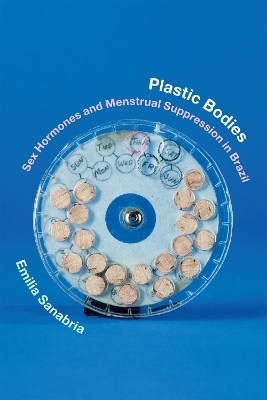
Plastic Bodies
Sex Hormones and Menstrual Suppression in Brazil
Seiten
2016
Duke University Press (Verlag)
978-0-8223-6142-8 (ISBN)
Duke University Press (Verlag)
978-0-8223-6142-8 (ISBN)
In Plastic Bodies Emilia Sanabria examines how women's use of sex hormones in Bahia, Brazil for menstrual suppression shapes social relations, having become central to contemporary understandings of the body, class, gender, sex, personhood, modernity, and Brazilian national identity.
In Plastic Bodies Emilia Sanabria examines how sex hormones are enrolled to create, mold, and discipline social relations and subjectivities. She shows how hormones have become central to contemporary understandings of the body, class, gender, sex, personhood, modernity, and Brazilian national identity. Through interviews with women and doctors; observations in clinics, research centers and pharmacies; and analyses of contraceptive marketing, Sanabria traces the genealogy of menstrual suppression, from its use in population control strategies in the global South to its remarketing as a practice of pharmaceutical self-enhancement couched in neoliberal notions of choice. She links the widespread practice of menstrual suppression and other related elective medical interventions to Bahian views of the body as a malleable object that requires constant work. Given this bodily plasticity, and its potentially limitless character, the book considers ways to assess the values attributed to bodily interventions. Plastic Bodies will be of interest to all those working in medical anthropology, gender studies, and sexual and reproductive health.
In Plastic Bodies Emilia Sanabria examines how sex hormones are enrolled to create, mold, and discipline social relations and subjectivities. She shows how hormones have become central to contemporary understandings of the body, class, gender, sex, personhood, modernity, and Brazilian national identity. Through interviews with women and doctors; observations in clinics, research centers and pharmacies; and analyses of contraceptive marketing, Sanabria traces the genealogy of menstrual suppression, from its use in population control strategies in the global South to its remarketing as a practice of pharmaceutical self-enhancement couched in neoliberal notions of choice. She links the widespread practice of menstrual suppression and other related elective medical interventions to Bahian views of the body as a malleable object that requires constant work. Given this bodily plasticity, and its potentially limitless character, the book considers ways to assess the values attributed to bodily interventions. Plastic Bodies will be of interest to all those working in medical anthropology, gender studies, and sexual and reproductive health.
Emilia Sanabria is Maîtresse de conferences in Social Anthropology at the Ecole Normale Supérieure de Lyon.
Acknowledgments ix
Introduction. Plastic Bodies 1
1. Managing the Inside, Out: Menstrual Blood and Bodily Dys-Appearance 43
2. Is Menstruation Natural? Contemporary Rationales of Menstrual Management 71
3. Sexing Hormones 105
4. Hormonal Biopolitics: From Population Control to Self-Control 129
5. Sex Hormones: Making Drugs, Forging Efficacies 159
Conclusion. Limits That Do Not Foreclose 187
Notes 207
References 223
Index 241
| Erscheinungsdatum | 22.04.2016 |
|---|---|
| Reihe/Serie | Experimental Futures |
| Zusatzinfo | 12 photographs |
| Verlagsort | North Carolina |
| Sprache | englisch |
| Maße | 152 x 229 mm |
| Gewicht | 499 g |
| Themenwelt | Sachbuch/Ratgeber ► Gesundheit / Leben / Psychologie |
| Studium ► 1. Studienabschnitt (Vorklinik) ► Physiologie | |
| Sozialwissenschaften ► Ethnologie | |
| Sozialwissenschaften ► Soziologie ► Gender Studies | |
| ISBN-10 | 0-8223-6142-6 / 0822361426 |
| ISBN-13 | 978-0-8223-6142-8 / 9780822361428 |
| Zustand | Neuware |
| Haben Sie eine Frage zum Produkt? |
Mehr entdecken
aus dem Bereich
aus dem Bereich


